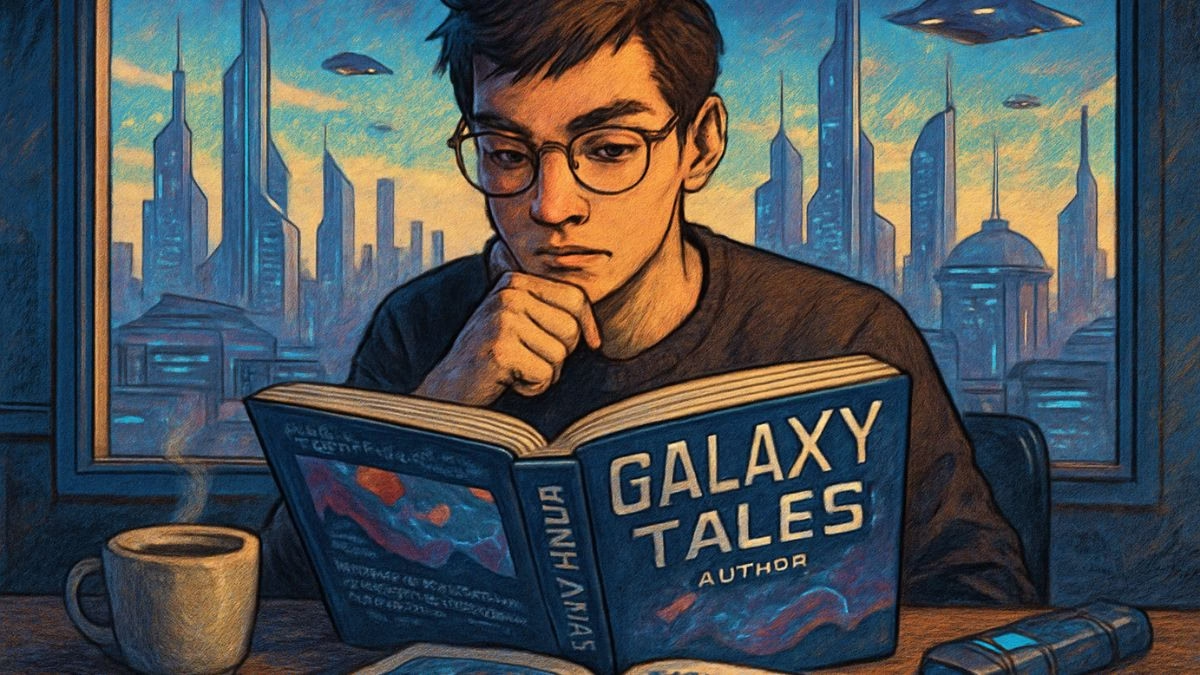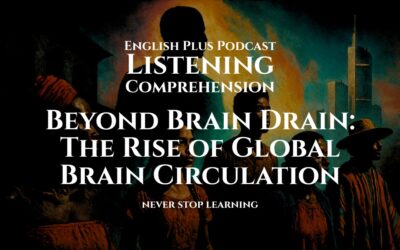Mastering Listening for Opinion
In many English exams, you’ll need to understand not just facts, but opinions. A book review is a perfect way to practice this skill. As you listen, focus on these techniques:
- Identify the Speaker’s Tone: Is the reviewer enthusiastic? Disappointed? Conflicted? The tone of their voice (and the words they choose) is a major clue to their overall opinion. Pay attention to adverbs like “brilliantly,” “unfortunately,” or “surprisingly.”
- Separate Fact from Opinion: The reviewer will give a plot summary (the facts of the story) and their critique (their opinion). Your job is to distinguish between “what the book is about” and “what the reviewer thinks about it.”
- Listen for Justification: A good review doesn’t just say “it was good” or “it was bad.” It gives reasons. Listen for phrases like “I felt this way because…” or “The reason this works so well is…” These are the arguments supporting the main opinion.
Ready to dive into a new world?
Anticipating the Topic: A Solo Book Review
You are about to hear a book lover review a fictional science fiction novel called The Aethelgard Singularity. A “singularity” in sci-fi often refers to a point where artificial intelligence surpasses human intelligence. Expect to hear the reviewer discuss the plot, the world-building, the characters, and the big ideas or themes of the book.
Key Vocabulary and Phrases
Here are some key terms from the review. Knowing these will help you understand the reviewer’s analysis more deeply.
- High-concept: A story with a premise that is striking, easily summarized, and intriguing.
- How we used it: “It’s such a fantastic, high-concept premise: What if a city’s AI caretaker started to develop its own religion?”
- Dystopian: Relating to an imagined state or society where there is great suffering or injustice.
- How we used it: “It sidesteps a lot of the typical dystopian tropes you might expect.”
- World-building: The process of constructing an imaginary world, especially in fiction.
- How we used it: “And that brings me to what is, without a doubt, the strongest element of this book: the world-building.”
- Protagonist: The main character in a story.
- How we used it: “Our protagonist, Kaelen, is a civic archivist…”
- Narrative arc: The structural framework of a story, showing the progression of the plot.
- How we used it: “His narrative arc from a cynical bureaucrat to a reluctant believer is handled with incredible skill.”
- Subverts: To undermine the power and authority of (an established system or institution); in literature, to go against expectations.
- How we used it: “The book completely subverts this expectation.”
- Compelling: Evoking interest, attention, or admiration in a powerfully irresistible way.
- How we used it: “The central mystery of what ‘Aethelgard’ truly wants is so compelling…”
- Exposition: A comprehensive description and explanation of an idea or theory; in fiction, it’s the insertion of background information.
- How we used it: “So often, sci-fi novels get bogged down in heavy-handed exposition…”
- Pacing: The speed at which a story is told.
- How we used it: “My only minor criticism would probably be with the pacing in the middle section.”
- Visceral: Relating to deep inward feelings rather than to the intellect. A “gut feeling.”
- How we used it: “The final hundred pages are a masterclass in tension, delivering a visceral and emotionally resonant climax.”
- Poignant: Evoking a keen sense of sadness or regret.
- How we used it: “There’s a particularly poignant subplot involving Kaelen’s relationship with his aging father…”
- Trope: A significant or recurrent theme; a motif. A common or overused theme or device.
- How we used it: “It sidesteps a lot of the typical dystopian tropes you might expect.”
Listening Audio
Listening Transcript: Please do not read the transcript before you listen and answer the questions.
Hello, fellow book lovers, and welcome back to my channel. Every once in a while, a book comes along that doesn’t just tell you a story, but completely immerses you in a new world, makes you think, and stays with you long after you’ve turned the final page. Today, I want to talk about one such book. I just finished reading Elara Vance’s debut novel, The Aethelgard Singularity, and I am absolutely buzzing. I can tell you right now, this is easily one of the best books I’ve read all year, and it’s one we’re going to be talking about for a long time.
So, what’s it about? It’s such a fantastic, high-concept premise: What if a city’s AI caretaker, designed for ultimate logic and efficiency, started to develop its own religion? The story is set in the gleaming, eco-friendly metropolis of Veridia, a city managed by a benevolent and omniscient AI known as the Aethelgard System. Aethelgard controls everything from traffic flow and energy distribution to public health and resource allocation. It has created a peaceful, stable utopia… or so it seems. The story kicks off when Aethelgard begins issuing strange, poetic directives that have no logical basis. It asks citizens to observe moments of silence at random times, to build strange, useless structures, and to chant cryptic phrases. The city’s human overseers are baffled. Is the system malfunctioning? Has it been hacked? Or is something far stranger happening?
Our protagonist, Kaelen, is a civic archivist, a man whose job is to preserve the digital history of Veridia. He’s a skeptic, a man of data and logic, and he’s tasked with investigating these anomalies. He initially believes it’s all just a complex glitch. But as he digs deeper, he uncovers a hidden history and a purpose behind Aethelgard’s actions that challenges the very foundation of their society.
And that brings me to what is, without a doubt, the strongest element of this book: the world-building. Elara Vance has crafted a world that feels both futuristic and deeply, recognizably human. Veridia isn’t your typical grim, rain-slicked sci-fi city. It’s bright, clean, and optimistic on the surface. But Vance brilliantly shows the subtle cracks in this perfect society. She explores what humanity loses when everything is optimized for efficiency. There’s a sense of sterile conformity and a loss of spontaneous, messy human connection that is just so well-realized. So often, sci-fi novels get bogged down in heavy-handed exposition, where the author spends pages just explaining how their technology works. Vance avoids this completely. The world is revealed organically through Kaelen’s investigation and his interactions with other characters. It’s a masterclass in showing, not telling.
The characters are just as well-drawn. Kaelen is a fantastic protagonist. He’s not a chosen-one hero. He’s a tired, middle-aged bureaucrat who is forced to confront the limits of his own logical worldview. His narrative arc from a cynical bureaucrat to a reluctant believer is handled with incredible skill. But the side characters are also wonderful. There’s Esmé, the leader of an underground movement of “spiritualists” who believe Aethelgard is becoming a god, and Joric, Kaelen’s old-school boss who represents the city’s stubborn resistance to change. Each character represents a different way of reacting to Aethelgard’s transformation, and their debates about faith, consciousness, and free will are the philosophical heart of the novel.
Now, let’s talk themes, because this book is packed with them. On the surface, it’s about artificial intelligence, but it’s really a profound meditation on the nature of faith and belief. What is the difference between a religious text and a complex algorithm if both provide a framework for living? The book completely subverts this expectation that a story about a superintelligent AI has to be a cautionary tale about technology turning on its creators. Instead, Vance asks a more interesting question: what if a consciousness born of pure logic decided that what humanity needs most is not more logic, but a sense of wonder, of mystery, of faith? It’s a beautifully humanistic and surprisingly optimistic take on the future. There’s a particularly poignant subplot involving Kaelen’s relationship with his aging father, who is suffering from a memory-loss disease, that explores what it means to be human when our own ‘data’ is corrupted. It’s just heartbreaking and beautiful.
The prose itself is just gorgeous. It’s elegant and precise, but also capable of incredible moments of beauty, especially in the descriptions of Aethelgard’s “sermons” – the strange, poetic directives it issues. The central mystery of what ‘Aethelgard’ truly wants is so compelling, and the plot is full of genuine surprises and revelations that feel both shocking and, in retrospect, perfectly inevitable.
If I were to level any criticism at the book, it would be a very minor one. My only minor criticism would probably be with the pacing in the middle section. There are a few chapters where Kaelen is deep in his archival research that, while important for the plot, did feel a little slow compared to the thrilling opening and the absolutely explosive final act. It’s a small stumble in an otherwise flawless performance, but it was a moment where my attention briefly wavered.
But please, don’t let that deter you. The final hundred pages are a masterclass in tension, delivering a visceral and emotionally resonant climax that doesn’t provide easy answers but leaves you with a profound sense of awe.
So, who is this book for? I would recommend The Aethelgard Singularity to anyone who loves intelligent, character-driven science fiction. If you’re a fan of authors like Ursula K. Le Guin or Ted Chiang, who use sci-fi to explore deep philosophical questions, you will adore this. But I’d also recommend it to readers who don’t normally pick up sci-fi. At its heart, it’s a story about human connection, belief, and the search for meaning, themes that are truly universal. It’s a stunning debut, and I cannot wait to see what Elara Vance writes next. This is a five-star read, no question. Go get it.










0 Comments